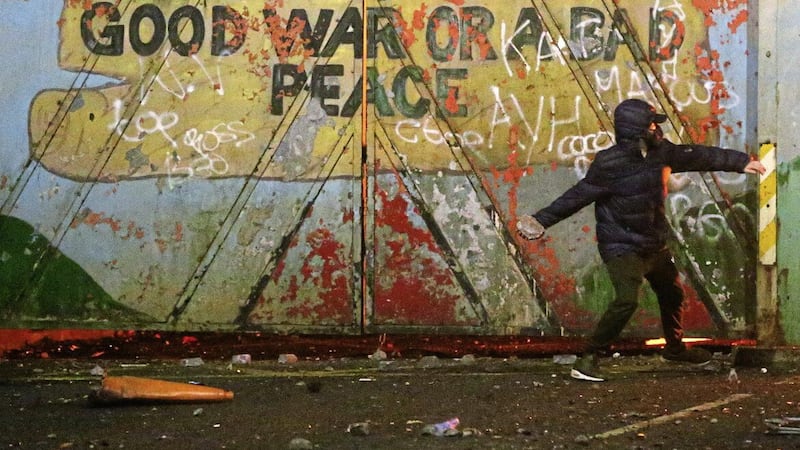THERE were two stories revolving around our young people last week. One quite depressing, the other uplifting. I suppose that is the way of us here. Awfulness and light, highs and lows, rinse and repeat, forever.
One story showcased in stark detail how paramilitaries still have a vice-like grip on some communities, even 25 years after the Good Friday Agreement and the promise that they would leave the stage.
It was revealed that some young people who took part in serious rioting in Belfast's Lanark Way in April 2021 did so to clear drug debts to paramilitary groups.
The revelation came about when Megan Phair, from the Stop The Attacks Forum, was giving evidence to the House of Commons Northern Ireland Affairs Committee, in a session that was looking at paramilitary activity here.
During the worst of the Belfast violence, which erupted on the Lanark Way peace line, 88 police officers were injured and a bus hijacked and set alight. The trouble was said at the time to have been an expression of young people's anger over the Irish Sea Border, about Brexit, about lack of police action over the lockdown funeral of prominent Sinn Fein member Bobby Storey. It ceased only as a mark of respect to the royal family when Prince Phillip passed away.
It was revealed this week that some of the young people were rioting at the behest of paramilitaries to clear drug debts.
"From what I've heard from young people, they can get up to £80 of drug debt cleared," said Megan Phair.
"These young people are terrified. They don't have £50 or £100 but they can go out and riot. They are victims of exploitation and coercion."
That version of events flies in the face of the views of commentators who peddled the notion that young people were rioting because they were frustrated over politics and not having their voices heard.
It was grim and depressing listening, but not all that surprising. Spend any time at a riot or street disturbance and you'll see there's a choreography going on behind the scenes that is beyond the strategic abilities of a 12-year-old.
But at the end of the week another story emerged. It was a tale of young people from the same area working together to make life better for each other and others, to build a positive pathway away from the violence that can consume and destroy some young people's lives.
A unique new Open University course called Why Riot? Community, Choices, Aspirations is built firmly on the foundations of the experiences of eight young men from the Shankill Road.
The idea was born from the concern felt by Belfast Boys' Model School principal Mary Montgomery in the wake of the Shankill Road violence. She joined forces with the ACT Initiative, which run and works with former UVF prisoners, to develop a learning course for a small number of pupils aged between 14 and 16.
Those six-week sessions then grew organically into a full Open University course, which can be taken online or on a mobile phone, in which the story of the eight young men would be heard and their experiences understood.
Why Riot? is a free resource for young people to help them think critically about the choices they make and about how to act positively for change, around the issues they care about.
Course content includes understanding what community means to you, exploring different perspectives, questioning and evaluating information and influences on social media and elsewhere, decision-making, finding your voice and becoming positive changemakers. It covers topics like how to spot fake news, explore different opinions, think critically about life choices and how to work with others.
I think it's a brilliant way to help the next generation think about themselves, others, their communities and what part they can play in the betterment of them and of all our futures.
For more information on the free course, see open.edu/openlearn/education-development/why-riot-community-choices-aspirations/content-section-overview?active-tab=description-tab








